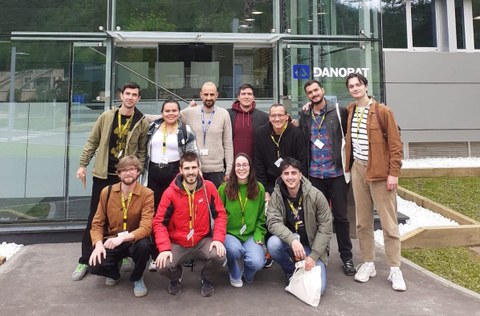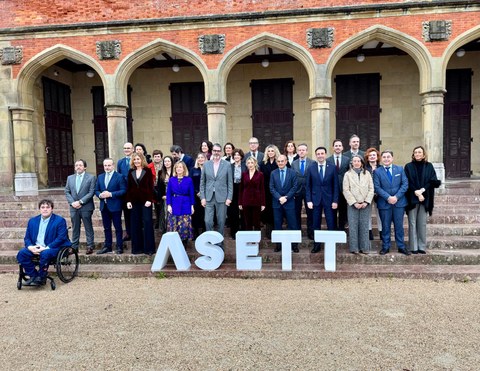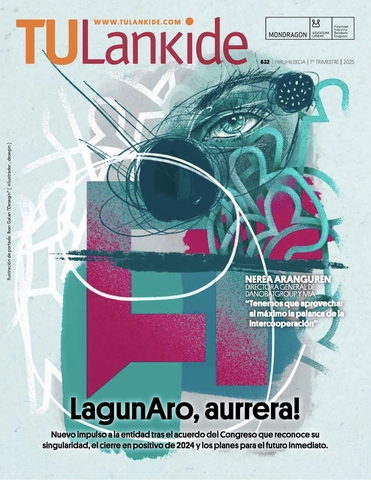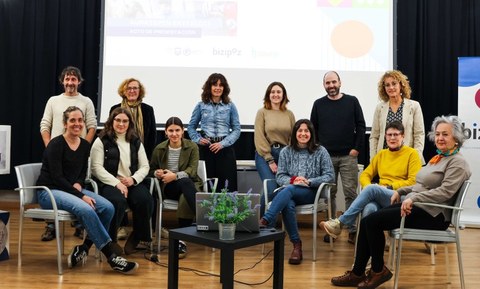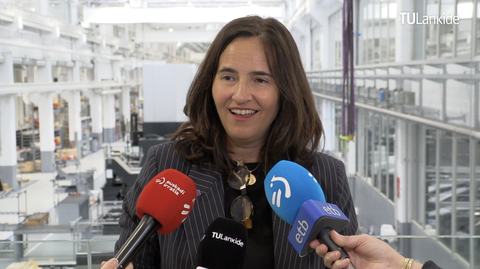Most read
- 1. Danobatgroup sets a new turnover record of €344 M in 2024
- 2. Danobat revolutionizes manufacturing with a new precision robot
- 3. MONDRAGON expands its digital presence with Bluesky
- 4. MONDRAGON leads ASETT, the Social Economy Hub for social transformation
- 5. Orbik Cybersecurity, the first technological start-up to become a co-operative
- 6. Eika acquires Stone Cooker S.L and its innovative 'Suiseki' table to boost growth
“The cooperative movement has grown in recent years as people look for more equitable and democratic ways to organize economic life”
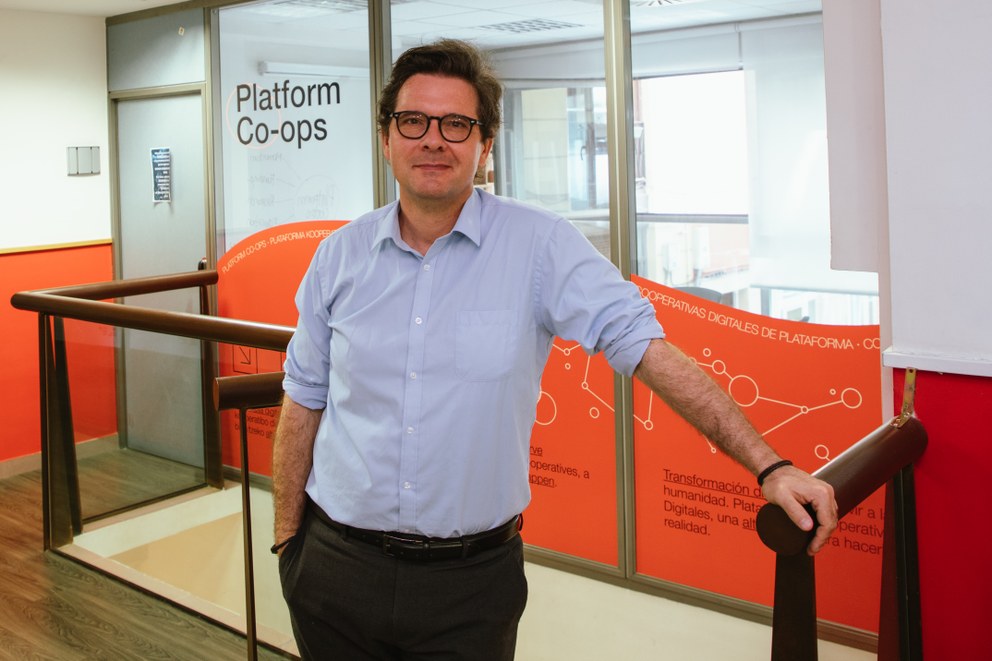
Trebor Scholz is a seven-month research professor at Mondragon University, focusing on cooperative digital platforms. We've met to discuss his work.
What brought you to Mondragon University? How is your stay going so far?
As a New School professor, author, and community-engaged researcher, I am the Founding Director of the Platform Cooperativism Consortium and the Institute for the Cooperative Digital Economy in NYC, as well as a Faculty Affiliate at Harvard University's Berkman Klein Center for Internet & Society, and a visiting professor at Mondragon University. What brought me to Mondragon was a combination of factors, but principally the opportunity to learn more about this world-renowned cooperative ecosystem and bring together some of our work in NYC with what is happening here in the Basque Country. Mondragon is an amazing place— the scenery is beautiful, and Basque history is fascinating. I was invited to come here to help start an institute focused on “platform cooperatives” at Mondragon. This is a great honor, and I am excited to help create a space for exploring new ways of organizing work, data, economic life in the digital economy. We already started a small Platform Co-op Lab (PCL) at the Bilbao Berrikuntza Faktoria. Stay tuned for more information on what this will entail!
What is a ‘platform co-op” and how does it differ from traditional businesses models? What is the history? How did it emerge? Are they “real”?
Platform cooperatives are businesses that sell goods or services primarily through the internet. They're different from traditional businesses in a few ways: first, they're democratically owned and controlled by their members. Second, they're focused on providing social and environmental benefits as well as profits. And third, they use technology, often open source, to connect customers and producers directly, cutting out the middleman. Platform coops can be a powerful tool for building a more equitable and sustainable economy.
Most people think of platforms as big, faceless corporations like Amazon or Uber. But what if your favorite online marketplace, social media site, or dating app would actually run cooperatively? In other words, by you and your fellow users? Turns out, many of them are – and you may already be part of one without knowing it. From food co-ops, solar energy coops, to elder care platforms, these organizations are proving that it is possible to democratically organize and build power against the monopolies.
I framed the concept of platform coops in 2014 with an essay, then a long paper, two books, seven conferences, and the formation of two organizations: Platform Cooperativism Consortium and the Institute for the Cooperative Digital Economy at The New School in NYC. I’m revisiting the idea now because so many people are thinking about platform cooperatives in the context of Web3, crypto, and blockchain technologies. Since that initial work, there has been incredible momentum for this organizing principle across sectors and around the world. We count more than 500 projects in more than 30 countries. Some generate over 200 million Euros in revenue a year, but most are small. In addition to broader interest in platform cooperatives, worker-owned cooperatives have seen a resurgence. There are also new attempts to organize digital commons economies beyond corporate platforms.
What about the Platform Coops Now! course?
If you're at all interested in the future of work and alternative economies, the Platform Cooperatives Now (PCN) course is worth checking out. Offered through Mondragon –the university and the corporation– and Platform Coop Consortium at The New School in New York City, this 15 week online course provided an introduction to the theory and practice of platform cooperatives. In 2020, two delegates from the Mondragon Corporation came to the New School in order to assess the potential to collaborate with the PCC. As a result of this collaboration, the course was developed to foster a global community in this space, assist participants in building their own platform cooperatives, and assist policymakers and researchers in entering this emerging field of research. In four Platform Cooperatives Now iterations, we taught approximately 1,300 participants and collaborated with partner organizations from 62 countries. This work resulted in the establishment of platform coop incubators in a number of countries. Whether you're a worker, entrepreneur, or activist, PCN offers a wealth of information and resources. Simply put, PCN is one of the most comprehensive introductions to the cooperative digital economy available. If you're looking to dive into this growing movement, then look no further. We are in the process of converting the course into an open resource.
In this context, what new opportunities are opening up for the MONDRAGON cooperative movement?
There are several factors that make MONDRAGON a unique opportunity for the platform cooperative movement. MONDRAGON has a long history, large number of employees, and geographically dispersed locations. Additionally, there are a number of different types of cooperatives in the MONDRAGON network which could contribute their business development insights to this emerging area. Finally, MONDRAGON is confronted with several challenges that present opportunities for the development of platform cooperatives within the existing MONDRAGON cooperatives, such as the Laboral Bank, LKS Cooperative (MONDRAGON’s Consulting Coop), Mondragon University, and the Basque Culinary Center, as well as in its international work in Brazil and collaboration with the city of Preston in the United Kingdom. Collaboration among existing Mondragon coops - whether in the form of data cooperatives or better resource coordination - also presents an important opportunity for platform coops. A strategic collaboration between MONDRAGON and the Platform Coop Consortium and its global network is an opportunity for the global cooperative movement to bring together this international movement with the insights from large, successful cooperatives in the Mondragon Valley.
The Basque people have a long history of cooperative enterprise and the region has a strong digital infrastructure and a developed startup culture.
First, the Basque people have a long history of cooperative enterprise and the region has a strong digital infrastructure and a developed startup culture. Finally, first platform cooperatives are already emerging in the Basque Country. All of these factors point to the opportunity for launching platform coops in the region. So far, only a few initiatives have emerged, but there is potential for many more to follow suit and help build a brighter future for Basque workers and communities.
We are excited to share that one of our research fellows, Sain Lopez, has written about this topic. In her post, Platform Cooperatives “Made in MONDRAGON”?, mapping out her work as ICDE fellow over the next 11 months, she provides an analysis of MONDRAGON’s success and argues for platform coops. We hope you'll read her post and join the conversation.
What challenges have been faced in the transition to a platform co-operative?
The cooperative movement has grown in recent years as people look for more equitable and democratic ways to organize economic life, also online. Platform cooperatives are one promising example of this trend, which uses online platforms to provide workers and users of the platform with shared ownership and governance. Despite this promise, there are numerous obstacles that must be overcome in order for them to be successful. This includes creating an effective business model (different for each sector), fostering a cooperative culture, and enhancing technological capabilities. There is also a need for supportive policy environments and financing mechanisms that recognize platform co-ops' distinct characteristics. Global coordination and community building among these projects are also essential. By addressing these issues, we can unleash the power of platform cooperatives to build a more democratic economy, both online and offline.
So why should workers around the world care about MONDRAGON?
MONDRAGON worker-cooperatives are coming under fire from critics who say the digital platform model is a better way to do business, that it is the future. So why should MONDRAGON workers care? Mondragon workers should care about the various platform coop models because they offer a more democratic and equitable way of organizing platform work. With its successes and growing network of affiliated cooperatives, it's not surprising to wonder if the MONDRAGON model could work in other places and industries. Platform cooperatives are businesses that are owned and controlled by their members, who use a digital platform to provide goods or services. Unlike traditional tech companies, in which workers are at the mercy of their “algorithmic bosses,” platform coops give workers a voice in how the business is run. This makes them better suited to compete in today's economy, while preserving the democratic values that have always been central to the cooperative movement in the Basque Country and beyond.
The cooperative movement is sometimes seen as old-fashioned and irrelevant to younger generations. But this doesn't have to be the case! The platform coop movement is a novel model that can make the cooperative model more attractive and relevant to young people. So if you're interested in starting your own tech startup that aligns with your values, check out platform coops! You won't be disappointed. And if you're looking for an antidote to the ills of corporate digital globalization, platform cooperatives are definitely worth exploring!
To capitalize on the existing global movement, MONDRAGON, in collaboration with the Platform Cooperativism Consortium, can apply for grants, participate in business and community development projects, and conduct research. Platform cooperatives are a new set of models of cooperative enterprise that are designed to meet the needs of the 21st century. So don't put it off any longer; begin exploring today!













